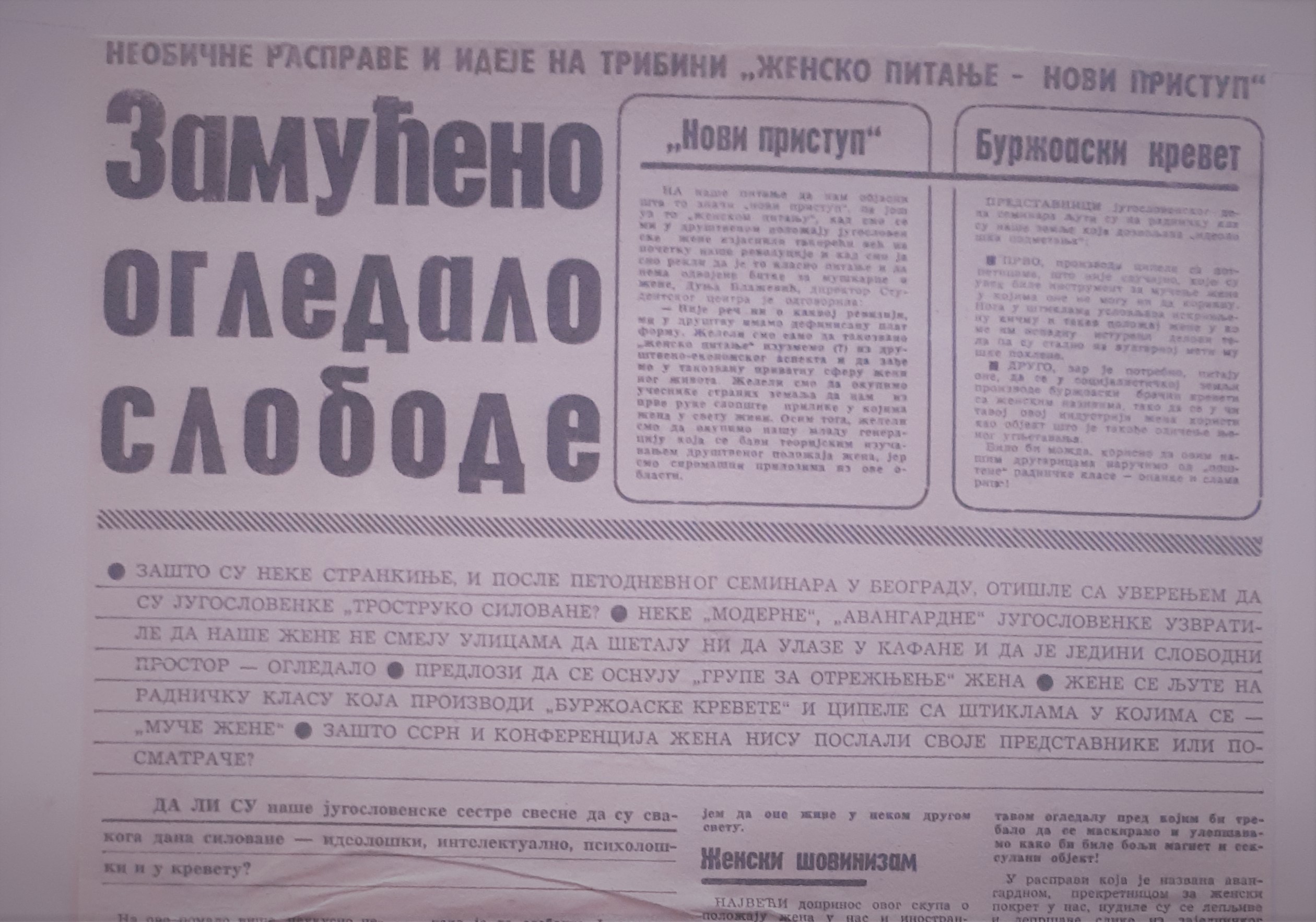As an important part of the collection, we note the files on the first feminist conference 'Comrade Women', which was interpreted as an attack on socialist values and which caused great media controversy and led to verbal attacks on its participants.
The conference 'Comrade Women' was the first feminist conference in Eastern Europe and took place at SKC from October 27 to November 1 in 1978. It was in fact an international symposium on which theoreticians from different countries participated. The material from this symposium is kept in the archive called “Women's Question - A New Approach”, forming a 200-page publication. In addition, it is possible to follow the reactions of the Yugoslav print media in the press clipping collection, in which the views expressed at this conference were subject to criticism from different viewpoints. Their initiative was characterized as subversive or with the lowest terms "as a leftover childhood disease" http://www.republika.co.rs/550-551/17.html
The main scandal aroused in an article of “Evening News” [Večernje novosti] (6 November 1978) under the title "Blurred mirror of freedom" in which a critical review of this gathering was presented. The authors of the text referred to a provocative question from one of the participants at the very beginning: "Are our Yugoslav sisters aware that they are raped every day - ideologically, intellectually, psychologically and in bed?" No less controversial questions were: Is it possible in Yugoslavia to establish groups for self-awareness of women in factories, universities, to form women's courses and departments? Is it possible to establish feminist papers that will not oppress women's rights, instructing them on how to become and remain a beautiful and good wife? Is it possible to prevent the exploitation of sex with which Yugoslavs are flooded on TV and print? All of this was too much for contemporary society, and it was interpreted as an attack on the Yugoslav social system and the freedoms it gave to women.
In "Večernje novosti”, the journalists insisted that the participants did not respond to the fact how “the free Yugoslav Woman in the constitution and laws, and in life, was enslaved.” The statements of Yugoslav participants, as well as attitudes towards Yugoslav society and the position of women in it were criticized. Particularly problematic was the statement of Rada Ivekovic, who said that "in Yugoslavia, women cannot move freely, without being exposed to maltreatment of men who throw themselves on them! Women could not enter the tavern alone without being targeted by male voracity! We're locked in the walls of our homes. The only place in this society reserved for us is in a shining mirror, in front of which we should mask and beautify ourselves to make us a better magnet as a sexual object!"
The way "Večernje novosti” interpreted this was paradigmatic. The journalists of this newspaper wrote that statements like this were the result of "unfulfilled self-management at home of some of our comrades". Had it not had an international character, the whole conference would be characterized as "casual chatting over coffee" and "idle lamenting". Problematically assessed was also the statement of the chairperson Žarana Papić, who said that the Yugoslav feminists will not work together with the [party-driven] Conference on Social Activity of Women. "They could actually do something, not just keep preaching" were the words of Papić, for which she was resented.
"Večernje novosti" continued with attacks in their following issues. The text "Equality depends on woman" was asking whether "our society needed groups for sobering women in factories and universities" and “what kind of suggestions were made at this gathering? […] they are unable to accept the constitutions and laws that offered freedom to them. Why are women angry at the working class that produces ‘bourgeois beds’ and shoes with tights in which ‘women are being tortured”. The reactions of the readers who defended Yugoslav society were published too, like for instance: "I’ve had much in life, as much as I’ve managed to get through. I appreciate the free choice and all the opportunities that have been provided for me in this society." (Večernje novosti, November 12 1978). One female reader wondered why at that gathering "there were no workers, housewives, clerks, or were they all bigoted to understand some absurd feminist calls and recipes for a happy life?" The actress Vera Čukić praised Yugoslav society and development with the words "we have built large and modern cities all these years, but we should not forget what is very important, that we built even more modern constructions - in people."
In the issue dated 13 November 1978, the text of Dunja Blažević, the director of the SKC, was published, which strongly criticized the text "Blurred mirror of freedom", denying the allegations and explaining that the goal of the gathering was to promote the idea of a "new approach" to the female issue. That meant that it should be excluded from its socio-economic context. Regarding the complaint that the ‘Conference on Social Activity of Women’ and the SSRNJ (Socijalistički savez radnog naroda Jugoslavije - Socialist Alliance of Working People of Yugoslavia) did not participate, Blažević wrote that she believes that it would be "inappropriate for common sense and socialist self-justification that socio-political organizations are behind the initiatives and actions of cultural institutions."
However, already in the next sentence she notes that the nature of the gathering did not prevent the participants from "affirming the attitudes of our socio-political organizations." She particularly disapproved the criticism towards domestic participants who were considered to be incompetent.
The attacks continued - in one of the following issues, one of the articles was titled "New Approach – To What?" [
Novi pristup – čemu?]. This article specifically rebuffed that the feminists were "inadequately clearly demarcating the essential differences between women in capitalist countries and the socio-economic position of a Yugoslav woman who had, long ago, on the normative level, achieved what most of these movements are still struggling for (equal pay for equal work, the decisive word in family planning, etc.).”


